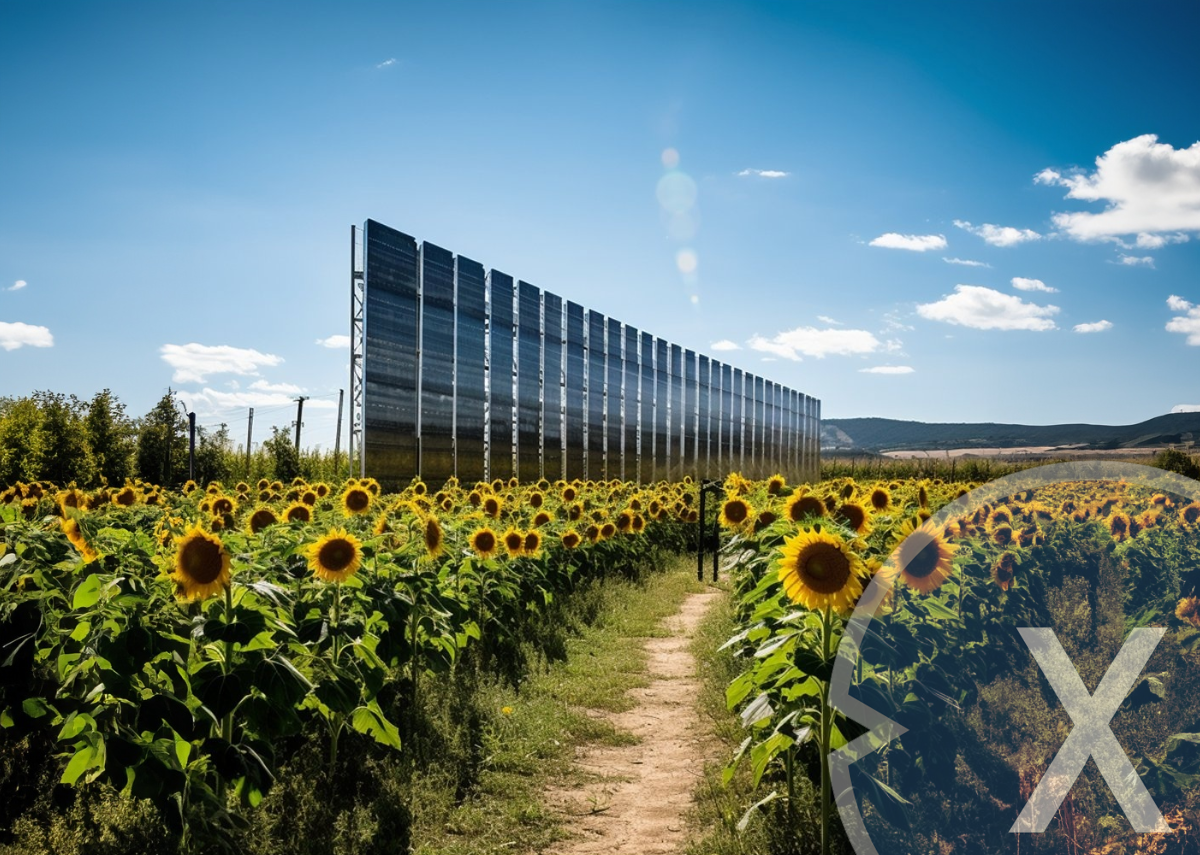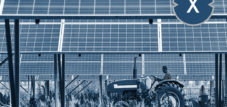
AI & XR 3D Rendering Machine: Great potential with Agri-PV: Agri-photovoltaics hardly used in Germany - Image: Xpert.Digital
🌱🌞 Agri-photovoltaics (agri-PV) in Germany: An innovative method to combine agriculture and solar energy production
🌱💡 Agri-PV: Synergy of agriculture and renewable energies 🌞🌾
Agri-photovoltaics (Agri-PV), an innovative method of combining agriculture and solar energy production, is still at the beginning of its development in Germany. With a currently installed capacity of only 14 megawatt peak (MWp), this technology accounts for less than one per thousand of the total installed photovoltaic capacity. Nevertheless, the sector is on the rise and it is expected that installed capacity could grow to up to one gigawatt by 2025.
🌿🔌 The dual use of agricultural land: increasing efficiency and contributing to the energy transition
The conceptualization of Agri-PV offers a dual use opportunity for agricultural land by simultaneously using it for food production and energy generation through photovoltaics. This synergy makes it possible to increase the efficiency of land use and contributes to the energy transition. Agri-PV systems are usually designed so that the solar panels are installed at a certain height above the ground, leaving enough room for agricultural machinery and crop growth. For example, crops that require less direct sunlight can be grown under the modules, while at the same time the solar modules protect against weather influences such as hail or intense sunlight.
🌾⚙️ Funding and purchase agreements: Driving forces for the expansion of Agri-PV
The positive development in the field of Agri-PV is favored by various factors. On the one hand, funding through the Renewable Energy Sources Act (EEG) plays an important role. This law provides specific expansion paths for special types of solar systems, which also include Agri-PV. On the other hand, power purchase agreements (PPAs), long-term purchase agreements between energy producers and consumers, are driving the expansion of agri-PV. These contracts allow the electricity generated to be sold at fixed prices, creating planning certainty and stimulating investment in the sector.
🏞️🚜 Integration into agricultural practice: framework conditions and acceptance
The future success of Agri-PV in Germany depends on various framework conditions. Legal and administrative hurdles must be reduced and research and development promoted. In particular, it is important to develop models that show how agri-PV systems can be optimally integrated into existing agricultural structures. Additionally, it is crucial to increase farmer acceptance by clearly communicating the benefits of agri-PV and addressing existing concerns about impact on cropland.
💰💡 Diversified source of income and contribution to the energy transition
Integrating agri-PV into agricultural practices can become a diversified source of income for farmers. Through additional energy production, farmers can make a contribution to the energy transition and at the same time stabilize their economic situation. This is particularly important in times of low producer prices for agricultural products and rising energy costs.
🌍🌱 Agri-PV for a sustainable future in Germany: Climate goals and the future viability of agricultural businesses
Agri-PV has the potential to become an important building block for a sustainable future in Germany. The combination of agricultural production and energy generation can not only contribute to achieving climate goals, but also offers an innovative opportunity for farmers to make their businesses sustainable. With the right framework conditions and incentives, the expansion of agri-PV in Germany could progress significantly by 2025 and make a significant contribution to the energy transition.
📣 Similar topics
- 🌞 Agri-photovoltaics: Agriculture and solar energy in harmony
- 🌾🔌 Efficient land use: Agri-PV for food and energy production
- 📈 Agri-PV: On the way to one gigawatt in Germany
- 🚜🌞 Dual use of agricultural land: Agri-PV as a solution
- 🌱🔋 Agri-PV on the rise: the future of agriculture
- 💡🌾 Agri-PV: Sustainability for farmers and energy transition
- ⚙️ Promotion and expansion of Agri-PV in Germany
- 🌍🔌 Agri-PV: Contribution to the energy transition and climate goals
- 👩🌾💰 Agri-PV: Diversified source of income for farmers
- 🇩🇪 Agri-PV: Sustainable future for Germany
#️⃣ Hashtags: #AgriPV #Agriculture #Energy Transition #Climate Goals #Sustainability
🌞🌱 Agri-photovoltaics as a future determinant of the energy transition: dena publishes groundbreaking impulse paper 📜☀️
🌍 Introduction: The role of Agri-PV in Germany's energy transition 🔄
In Germany, a country that is consistently working on implementing its energy transition, agri-photovoltaics (agri-PV) is emerging as a promising technology that can revolutionize both energy production and agriculture. With the aim of promoting and accelerating the expansion of photovoltaic systems, the federal government is currently negotiating Solar Package I, which could support the increased use of solar technologies in agriculture. Against this background, the German Energy Agency (dena) has published an impulse paper that lays the foundation and provides recommendations for action for a successful and dynamic market ramp-up of Agri-PV.
🌾 Agri-PV as a solution to existing conflicts between energy and agriculture 📈
This innovative concept of Agri-PV holds the promise of resolving existing conflicts between energy production and agricultural use through the dual use of agricultural land for energy production and agriculture. In addition to preserving agricultural yields, it contributes to adapting to climate change, protecting biodiversity and strengthening farms by allowing them to diversify their sources of income and increase their economic value.
🚜 Growth potential of Agri-PV and recommendations for action 🌟
Although the installed capacity of Agri-PV in Germany is currently relatively low at around 14 megawatts, the impulse paper predicts enormous growth: Up to one gigawatt of Agri-PV systems could be put into operation by 2025 through subsidized and non-subsidized projects. To realize this growth, the paper identifies four key areas of action:
1. 🔍 Clarity in the definition
It is essential to establish precise definitions and boundaries for agri-PV in order to create clarity in the market and support all players.
2. 🏗️ Improve approval processes
Spatial and regional planning must be adjusted to release more areas for agri-PV and to tailor compensation measures to actual use.
3. 💼 Optimize business models
The funding rules must be designed in such a way that they do not hinder innovation through excessively strict technological requirements, but rather promote the development of new agri-PV concepts and associated business models.
4. 💡 Increase visibility
The visibility of Agri-PV needs to be increased through the support of pilot projects, research activities and targeted communication campaigns to reach farmers and social awareness alike.
🤝 Collaboration and creation
The dena impulse paper was created in cooperation with the lawyers Becker Büttner Held (BBH), Elysium Solar GmbH and the Leibniz Center for Agricultural Landscape Research (ZALF). It makes a significant contribution to the discussion on the role of agri-PV in overcoming the complex challenges brought about by the energy and agricultural transition in Germany.
More about it here:
IMPULSE PAPER: What added value can agri-PV offer for the energy and agricultural transition?
Opportunities and challenges for the market ramp-up in Germany
🔍 SynAgri-PV research project
The report and the companies and institutions involved are part of the SynAgri-PV research project, which is supported by the Federal Ministry of Education and Research (BMBF). It provides essential information and contributes to developing a comprehensive understanding of the relevance and possibilities of Agri-PV in the context of the German energy transition and sustainable agricultural development.
🌱 Sustainability and climate protection
The Agri-PV concept also offers numerous advantages in terms of sustainability and climate protection. By obtaining agricultural yields under solar panels, the water requirement for the fields is reduced and the shade generated can create a cooler and wetter microenvironment, which is particularly beneficial for plants under climate change conditions. Additionally, if properly designed, the modular structure of Agri-PV can promote biological diversity by creating habitats for different animal species.
💰 Economic aspect for farmers
For farmers, these systems provide an additional source of income that is less dependent on weather conditions and market fluctuations. Electricity generation enables more stable planning and can also be used to supply energy to agricultural businesses, which in turn reduces operating costs.
🚧 Challenges and potential
However, in order to exploit the full potential of Agri-PV, there are also challenges that must be overcome. The compatibility of energy production and agriculture requires a careful planning and design process as well as targeted research to guarantee optimal conditions for both types of use.
🤝 Interdisciplinary collaboration
The implementation of Agri-PV requires close cooperation between various stakeholders: farmers, energy companies, technology companies, research institutions and politicians must work hand in hand to create framework conditions that enable this solution to be implemented quickly and effectively.
💼🌍 International networking and knowledge exchange
This networking also provides a platform for the exchange of knowledge and experiences that can contribute to the development of best practices and the improvement of the technical, economic and social aspects of Agri-PV. By sharing success stories and analyzing challenges, hurdles can be identified and eliminated more quickly and acceptance among citizens can be increased.
🌟 Future vision and ecological and economic benefits
Agri-PV therefore represents more than just an innovative technology; it shows what a sustainable and resilient energy system of the future could look like that generates both ecological and economic benefits. dena's impulse paper is a first step on a groundbreaking path that could lead to regenerative and efficient energy and agriculture not only in Germany but worldwide.
📣 Similar topics
- 🌱 Agri-PV: The future of energy production and agriculture
- 💡 Agri-photovoltaics: opportunities and challenges for the energy transition
- 🌾 Agri-PV: revolution in agriculture and energy production
- ⚡️ Agri-photovoltaics: The path to a sustainable energy transition
- 🌿 Agri-PV: The solution for energy and agriculture
- 🌞 Agri-photovoltaics: New perspectives for agriculture and energy supply
- 🚀 Agri-PV: On the way to the energy transition in agriculture
- 🔋 Agri-photovoltaics: The key to green energy and sustainable agriculture
- 🌍 Agri-PV: Sustainable energy and climate adaptation in agriculture
- 🌼 Agri-photovoltaics: potential for the energy transition and biodiversity
#️⃣ Hashtags: #AgriPV #Energy Transition #Agriculture #Sustainability #Climate Protection
Plan your solar system for the most common applications conveniently online with our solar system planner!
With our user-friendly solar system planner you can plan your individual solar system online. Whether you need a solar system for your home, your business or for agricultural purposes, our planner offers you the opportunity to take your specific requirements into account and develop a tailor-made solution.
The planning process is simple and intuitive. You simply enter relevant information. Our planner takes this information into account and creates a tailor-made solar system that meets your needs. You can try out different options and configurations to find the optimal solar system for your application.
Additionally, you can save your plan to review later or share with others. Our customer service team is also available to answer your questions and provide support to ensure your solar system is optimally planned.
Use our solar system planner to plan your individual solar system for the most common applications and advance the transition to clean energy. Start now and take an important step towards sustainability and energy independence!
The solar system planner for the most common applications: Plan the solar system online here - Image: Xpert.Digital
More about it here:
We are there for you - advice - planning - implementation - project management
☑️ Expert advice on energy-efficient renovation and new construction
☑️ with solar solutions and heat pumps/air conditioning systems
I would be happy to serve as your personal advisor.
You can contact me by filling out the contact form below or simply call me on +49 157 30 44 9 555 .
I'm looking forward to our joint project.
Xpert.Digital - Konrad Wolfenstein
Xpert.Digital is a hub for industry with a focus on digitalization, mechanical engineering, logistics/intralogistics and photovoltaics.
With our 360° business development solution, we support well-known companies from new business to after sales.
Market intelligence, smarketing, marketing automation, content development, PR, mail campaigns, personalized social media and lead nurturing are part of our digital tools.
You can find out more at: www.xpert.digital - www.xpert.solar - www.xpert.plus

